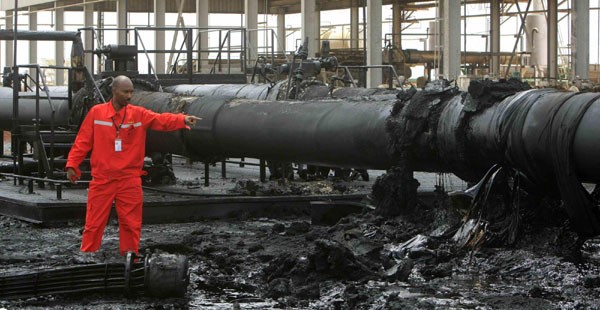Former Sudanese Minister of Energy and Oil Mohamed Abdullah over the weekend said the resumption of pumping South Sudan’s crude oil faces major challenges as the Rapid Support Forces (RSF) controlled the EL Eliaifoon Refinery for nearly one year, which forced the withdrawal of workers from the station.
He explained that resuming pumping requires understanding between the Government of South Sudan and the Rapid Support Forces.
“South Sudan’s government has a role to play in this, they can contact the higher commanders of the RSF to allow workers to resume their work and offer them protection,” Abdullah told Radio Tamazuj.
For his part, the former Undersecretary of the Sudanese Ministry of Energy and Oil, Hamid Suleiman, added that resuming pumping requires addressing the problems that led to the stoppage, including the shortage of gasoline used to heat the waxy crude oil, which led to the freezing of oil in the pipes and caused them to break and leak crude.
He emphasized that technical and security solutions must be provided to ensure a sustainable resumption of the pumping process.
This comes after the Sudanese Minister of Energy and Petroleum announced on Sunday that Sudan and South Sudan have reached an agreement to resume pumping South Sudanese oil after seven months due to technical and security problems.
Muhieddin Al-Naeem explained to Radio Tamazuj that the meetings between the two sides, which were headed by the Undersecretary of the Ministry of Petroleum in South Sudan, Chol Deng Thon, resulted in an agreement to resume pumping and operate the pipeline to Port Sudan. He stressed that the halt negatively affected the people of the two countries as a result of attacks by rebel militias in Sudan.
The Sudanese minister added that a workshop will be held to coordinate efforts between experts from the two countries to overcome the technical and security problems that hinder the resumption of pumping, noting that the oil sector represents a “red line” for the interests of the two countries and that cooperation between the two sides will contribute to strengthening economic relations.
“The ongoing war is not in the interest of Sudan nor the neighboring South Sudan,” Minister Al-Naeem stated. “Both countries have been affected economically as the result of suspension of the oil flow.”
He confirmed that the South Sudanese delegation visited the oil export facilities at the port of Bashair on the Red Sea where they were briefed about challenges faced by Petrolines.
On his part, Undersecretary Deng said that their visit comes within the framework of the close relations between the two countries. He explained that the delegation was briefed on Sudan’s preparations to receive oil and arrangements made by the Sudanese Ministry of Energy to start the pumping process.
Deng also expressed his appreciation for Sudan’s efforts in this regard, noting that the resumption of pumping will have a positive impact on economic relations between the two countries.




